

Seattle Cosmic, or a small part of it, met again last Saturday in Mill Creek for an evening of board gaming and free love, modulo the free love. Present were Tim Higgins (host for the evening), Mark Purtill, and Ron Hale-Evans (that's me), for a total of three people. (Marty Hale-Evans and Dave Adams, both regulars, considered coming but were both sick.) We played two games: Taj Mahal and Cartel.
First up at 7:30 was Tim's copy of Taj Mahal, another Reiner Knizia design. Marty loves her Knizia, as do I. "You can tell Marty that she missed a Knizia game, and that's what she gets for being 'sick'", Tim said, making quotation marks in the air with his fingers.
"But she really is sick," I protested. "She has a bad cold, and she's been lying around moaning all day."
"Oh sure," Tim said, grinning. "Probably moaning, 'Why do I have to go to Tim's house tonight?'".
Actually, we were just kidding. Tim's house is very nice, and a good place to play games.
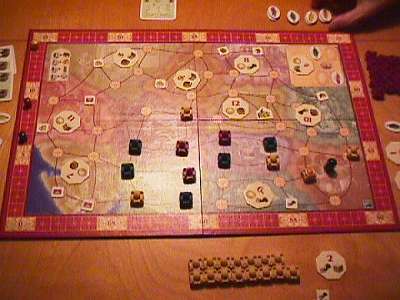
Only Mark had played Taj Mahal before, so he explained it to us. Taj Mahal, as you might guess, has an Indian setting, and the object is to score as many points as possible by (a) connecting districts with strings of palaces placed at strategic locations on the board, and (b) collecting as much as you can of certain commodities, such as gold and tea. (The more of each commodity you collect, the more each subsequent item of that commodity is worth.) You obtain commodities and the rights to build palaces by bidding for them with cards from your hand. It pays to miss an auction round if you don't think you can win anything, because you conserve your cards for the next round, and get extra ones besides.
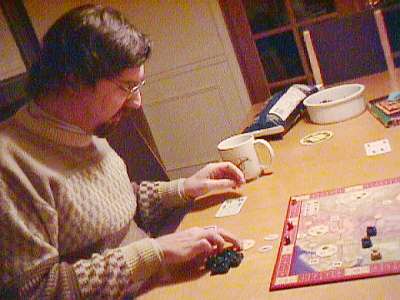
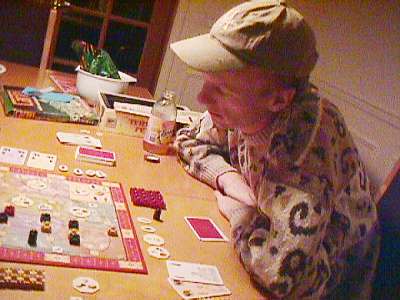
You can also win points in other ways. For example, if you manage to win two of certain tokens, you can trade them in for special cards. One special card, which we called the Yellow +2, allows you to gain two points virtually every turn for as long as you have it, even if you don't win any auctions. I had the Yellow +2 for virtually the entire game; I got most of the yellow bid cards, so I was able to keep it and get +2 points every turn.
I was way ahead in scoring for most of the game (sometimes 15-20 points ahead), but Mark picked his battles and conserved his cards when he thought he couldn't win, and at the end of the game, had a massive hand that let him take most of the items in the last few auctions, for a splendid come-from-behind victory.
Tim picked up quite a few points toward the end too. He had predicted, "Mark will STOMP us!". In the end, it wasn't that bad:
Mark ..... 56 Ron ...... 53 Tim ...... 49
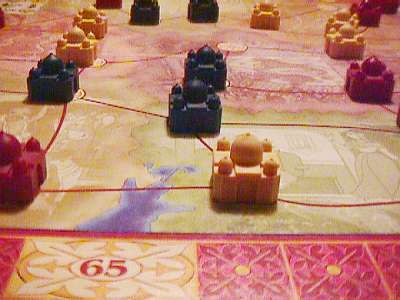
Mark's prize for the game was a tiny Jack of Hearts card embedded in a clear bouncy-ball. If he keeps playing like this, maybe he'll win the whole deck.
Next up at 9:15 was Tim's copy of the classic financial game Cartel (Phil Orbanes, Gamut of Games, c. 1974). We had played Dallas a few months ago (2001-07-28, no newsletter yet). Dallas is virtually identical to Cartel, but with a thin retheming based on the 1980s TV soap opera of the same name. I didn't ask Tim how much he'd paid for Cartel, but I've seen prices on eBay in the $45 range, with days to go on the auction. However, not a lot of people know about the Dallas-Cartel connection, and I was able to obtain a shrinkwrapped copy of Dallas on eBay for $5.50. I don't think there were any other bids! But if you decide to go the Dallas route, make sure you get the one from Maruca Industries. There are lots of Dallas spinoff games. Most of them look pretty lame, and are definitely not what you want.
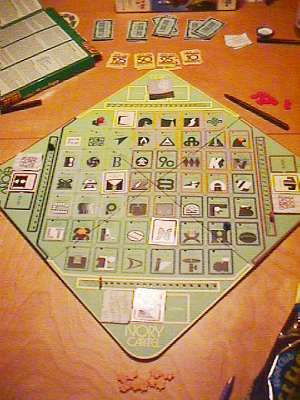
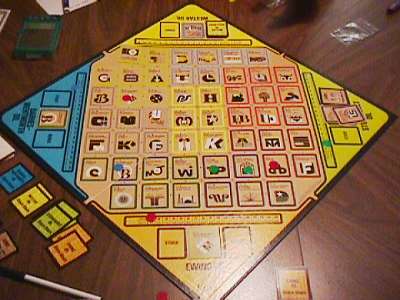
Each space on the board in Cartel is a corporation. Buying adjacent corporations enables you to form a bigger cartel, and gives bonus profits. Bonus profits increase your cartel's stock value, and ultimately your net worth. If you draw the right cards in your hand, you can simply buy adjacent corporations outright; otherwise, you might put one of the companies on the board up for auction.
You have three choices for how to pay for companies you buy in Cartel: (1) Cash in hand (you get $10M at the start of the game, but only the smallest companies cost this, so you'll probably burn through your seed money on your first turn. (2) Selling stock in your cartel -- but be careful; you'll want to keep as much stock as you can, because while your stock price rises as you buy companies throughout the game, so does your net worth. (3) Taking out a loan. Loans must be repaid at the end of the game, with interest, so again, you don't want to take out too many loans. But then again, you want to have cash and stock in hand at the end of the game too, so playing Cartel is a ceaseless process of juggling the various methods of buying companies.
I drew a lot of adjacent cards, and I managed to conserve my stock (I kept four of my nine stock certificates). Tim, on the other hand, drew lousy cards, and Mark was down to only two shares of stock in his cartel. I thought I was a shoo-in to win the game, but when we totted all our assets up at at the end, Mark had skunked me again! Here are the final scores:
Mark ..... $1027M Ron ...... $916M Tim ...... $711M
I don't know how Mark did it, except that, as he said, "I got cards."
Tim thinks that Cartel is better as a four-player game. When we played Dallas, there were many more auctions, which made drawing lousy cards less painful. We wondered if the rules were slightly different for the two games, or whether we had more auctions simply because we had more people. Also, Tim, who actually ran out of stock markers with which to buy companies before the game was over, asked me to research whether there were more company markers in Dallas, since he didn't run out last time. Maybe in a postscript to this session report...
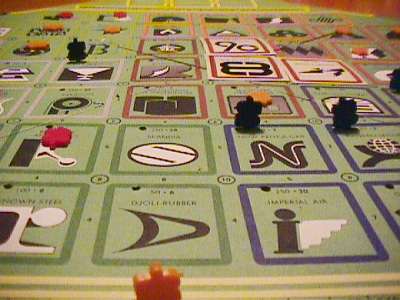
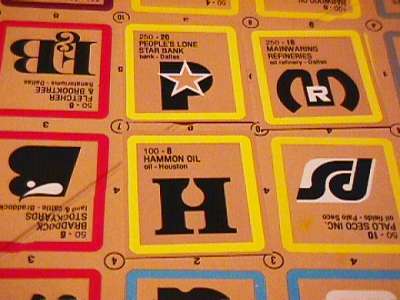
Above you can see closeups of the Cartel and Dallas board. It's remarkable how similar they are, even down to the style of the corporate logos. The Dallas set is of slightly higher quality, though; its board is in one piece, and it uses plastic tiddlywinks as company markers, while the Cartel set comes in four pieces and uses little dollar-symbol-shaped pegs that never fit quite right into the holes on the board. On the other hand, the Cartel company cards are white to contrast with the green board, and are easy to see, whereas the Dallas cards are the same colour as the board and are nearly invisible (which is why we placed them upside-down relative to the board in the photo on the right). On the other other hand, two areas of the board in Cartel are outlined in nearly identical colours, and their company cards are difficult to distinguish.
More Cartel/Dallas trivia:
We finished Cartel around 10:45. Although game nights often go until 1:00 AM and later, Mark usually leaves around 11:00, and I took my leave with him. Thus ended a quiet but fun Non-Cosmic Seattle Cosmic, in which Mark burned me twice. Mark, I won't forget this...
The Center for Ludic Synergy and Seattle Cosmic Game Night are now associates of Funagain Games. This means that 5% of your purchase there goes toward supporting us if you buy games there via the following links or the Funagain logo at the bottom of the page.
Even if you don't want to buy the games, the Funagain pages often contain lengthy, useful game reviews.
Saturday, 1 December 2001, 7:00 PM in Kent. Come play for fun and FABULOUS PRIZES!
Remember, Seattle Cosmic Game Night occurs every weekend, in one of three locations: West Seattle, Mill Creek, or Kent. Email Ron Hale-Evans for a full schedule. If you come, please bring a snack or drink to share (cookies, chips, soda, juice, etc.).

Seattle Cosmic Game Night Home | Center for Ludic Synergy home
All photos on this page copyright © 2001 by Ron Hale-Evans except where otherwise noted.
Maintainer: Ron Hale-Evans, rwhe@ludism.org
Page last updated 2001-11-30.